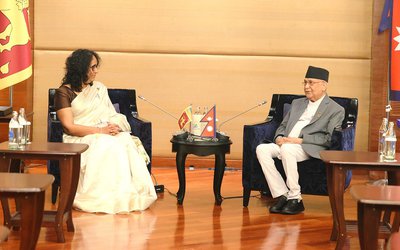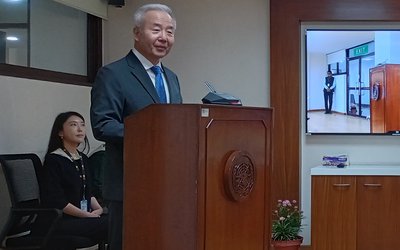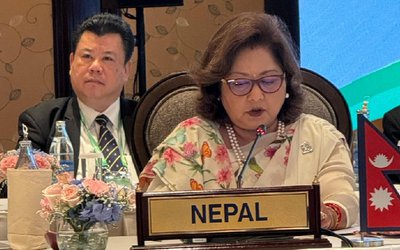
Nepal has established a good foundation to advance Climate Change Adaptation (CCA) at national and local levels. Adaptation communities are tracking experiences and lessons of NAPA-prioritised adaptation actions through LAPA framework, and NAP process. Nepal's NAPA and NAP formulation is both process and product oriented. Self-motivated and government nominated 201 members of nine working groups led by nine competent ministries are fully engaged in the NAP formulation process. Events are frequently organised for sharing the CCA experiences. Within the last one and a half month, five major events held in Kathmandu have shown that Nepal can be a 'learning centre' for CCA.
At a time when the NAP process is in a 'neutral gear', MoPE, in collaboration with UK-Aid ACT initiative managed by OPM and Practical Action and with support from ICIMOD, organised an interaction, 'review, reflection and consolidation workshop on NAP formulation process' on 1-2 June 2017 in Kathmandu. Presentations were made on key activities and outcomes of 13 months, climate trend analysis, and preliminary analysis of climate scenario of Nepal. ICIMOD is likely to come up with a complete climate scenario for Nepal by July 2017, and meteorological extremes by September 2017.
Active engagement of inclusive working groups, 'leave no one behind', and transparent and gender-sensitive approaches are considered very effective in bringing multi-stakeholders in the mainstream of the NAP formulation process. Thirteen months have been effective to clarify and adopt approaches to reach the 'destination' on a timely basis, establishing a very good foundation to address medium- and long-term adaptation needs of the country.
MoPE in its annual event (WED on 5 June 2017) released three useful documents to advance the NAP process, namely synthesis of nine working group-based stocktaking reports, vulnerability and risk assessment framework and indicators for all working groups, and observed climate trend analysis of Nepal (1971-2014) in the last 44 years.
On 21 June 2017, the Central Bureau of Statistics released a Report on National Climate Change Impact Survey 2016. The report provides data and knowledge on impacts of climate change on people and resources along with 32 (farm and off-farm) adaptation practices. This Survey conducted by a mandated institution provides 'perception-based' reliable information from 5060 respondents of age above 45 years who live in the same locality for over 25 years. Interestingly, about 70 percent of respondents (households) reported that they have changed 'food consumption habit' to adapt to climate change impacts. This survey provides a basis to advance the NAP process using practised adaptation options to adapt to climate change impacts in climate vulnerable areas.
ICIMOD organised a 'science-policy roundtable on climate change adaptation' on 29-30 June 2017 in Kathmandu to discuss on scientific evidence generated at regional/national level but having relevance for action at local level, adaptation solutions identified under ICIMOD's research initiatives, and future research areas and capacity needs.
Senior officials of State Government of India, namely Himanchal Pradesh, Manipur, Mizoram, Nagaland, and Uttarakhand, and experts from India, Nepal and Pakistan, including ICIMOD experts participated in the event designed to share CCA experiences in Indian States with focus on State Action Plan on Climate Change. Nepal's NAP process was shared with initial experiences. Enhanced consultative processes within and beyond 201 members of nine working groups coordinated by nine ministries are excellent platforms to work with and benefit from multi-stakeholders. This experience provides multiple opportunities to advance the NAP process in Nepal and other countries may wish to follow Nepal's practical and proven approaches.
On 11 July 2017, Ministry of Water Supply and Sanitation organised a workshop on 'climate change-friendly water supply and sanitation infrastructures' to inform multi-stakeholders on study-based impacts of climate change on water sources and livelihoods, and local innovative approaches in rehabilitating water supply systems. Studies confirmed that local communities are experiencing temperature rise along with irregular and high intensity rains and extreme weather events, observed drying-up of water sources and groundwater depletion, increasing of prolonged drought, and dysfunctional water supply systems. The study team proposed to, inter alia, use less water, harvest rainwater and develop water storage system, dig recharge pits and protect water springs, including implementation of LAPAs. Participants were also informed about the state of NAP preparation in Public Health (& WASH) working group. The Ministry has launched an online (khanepani news.com). Enhanced interest in integrating climate change would contribute to make water supply and sanitation infrastructures climate-resilient.
Adaptation for Smallholders in Hilly Areas (ASHA) Project organised a workshop on 'CCA capacity building for the staff of line Ministries' to inform key multi-stakeholders about project objectives, approaches and activities; understand experiences and lessons from other similar projects such as building climate resilience of watersheds in mountain eco-regions project, hariyo ban program, and share LAPA preparation experiences from ASHA project, including gender and social inclusion. Reflection and input from partners is expected to streamline activities to benefit climate vulnerable poor people of target areas of Rolpa, Rukum, Salyan, Jajarkot, Dailekh and Kalikot districts.
CCA integration is gaining importance and momentum in planning of climate impacted social and economic development sectors in Nepal. Implementation of people-centric NAPA-prioritized adaptation actions through LAPA framework and climate resilience activities has been instrumental in integrating CCA into relevant policies and programs. Initial learning from LAPAs and other activities would provide a solid basis to advance the NAP formulation process. About 7-8 years of concerted effort on CCA informs that multiple opportunities exist to make development climate-resilient and make Nepal an 'open museum for adaptation learning'.

Batu Uprety
Former Joint-Secretary and Chief of Climate Change Management Division, Ministry of Environment (then), and former Team Leader, National Adaptation Plan (NAP) formulation process. E-mail: upretybk@gmail.com
- Sagarmatha Sambad: Likely Bearing the Fruits
- Mar 27, 2025
- Decadal Experience In Preparing The NDC
- Mar 03, 2025
- Over Five Decades Of Concern On Air Pollution
- Jan 16, 2025
- Damaging The Functional EIA Track
- Dec 22, 2024
- Baku CoP29 Outcomes And Nepal's Initiatives
- Nov 26, 2024















